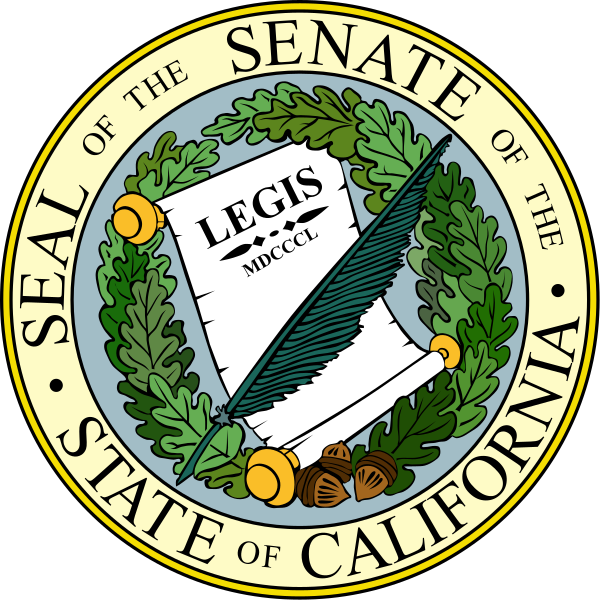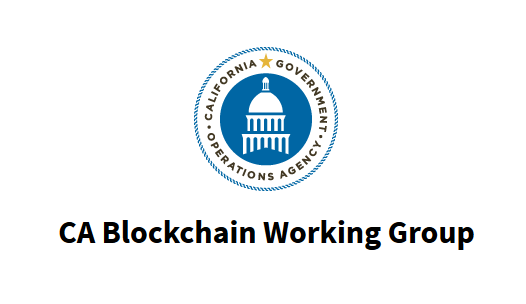CA Blockchain Working Group
The California Blockchain Working Group held it’s last meeting exclusively over Zoom, on April 7th at 10am. Several handouts are available at the Gov Ops Blockchain Working Group site. Here’s a link to sign up for notifications or view public notices. As usual, send comments up to 1 day prior to or following the meeting, by sending them to gabriela.montano@govops.ca.gov
There is another event involving a the Finance Subcommittee on April 22nd. The link to the info is here.

The meeting started off with a representative from California Assembly Majority Leader Ian Calderon’s office. Two bills are currently in legislation, AB 2004 which will be based on the blockchain working group recommendations and AB 2150 which is about including cryptocurrency under money transmission regulations.

California Senate Majority Leader Senator Hertzberg’s office was also present and mentioned their bill, SB 373. This bill covers the use of blockchain technology for vital records like Marriage, Birth and Death Certificates.
Surprisingly, the DMV is considering using blockchain technology. Specifically for identity and vehicle registration. The identity portion would allow for read only access to personal identifiable information. Everyone agrees that a bouncer doesn’t need to have access to your address to determine if you are of age. Additionally, a vehicle registration platform would speed up the transferring of titles or the registration process across state lines. I commend the DMV for already looking into these technologies.
The DMV is progressive, wait what?
Two California government agency CIOs said that departments don’t adopt new or unproven technologies. They also mentioned their current vendors are not suggesting blockchain solutions and smaller projects have a better chance of piloting a new technology.
The ongoing discussion of definitions took place prior to breaking for lunch. The text for the definitions can be found on the Gov Ops website, linked above.
After lunch, the presentations became more granular and focused on specific topics. The main ones were Privacy, Health Records, Supply Chains, Firearms, Property and Food & Agriculture.
Firearms was quickly dismissed as states like AZ, MO and TN have all sited privacy concerns. The Drug Supply Chain Security Act of 2013 requires companies to be compliant by 2023. Blockchain is an option for Pharma companies to provide transparency and traceability of their supply chains to government auditors.
It all comes back to identity
Most of the discussions on specific examples were topical and didn’t provide any real guidance or direction on how to implement an actual solution. Eventually most of the topics came back to the lack of a unified identity system.
The Financial Subcommittee was up next. This is a subgroup of the working group to discuss more granular topics relating to finance. Below are the topics of discussion:
- Social Benefits
- Business Licenses and Permits
- Archives – from paper to digital – possible local gov’t pilots
- Remittances
- Taxes
- Bonds
- Community Development Finance
- CalCoin
There was a brief discussion about two case studies involving Municipal Bonds using blockchain. One was from Jefferson County, WA to finance a firetruck, but I am unable to confirm this. I didn’t catch the other. Also mentioned was the World Bank blockchain bond from 2018.
Community Development Finance included discussion of CA AB857 on Public Banks and suggestions for pilots using blockchain in banking were requested.
The Business Permits and Licenses already have a digital system and little to no value is added when considering the amount of work to incorporate a blockchain into the system. The tax conversation did not take place. Archives was literally the same boring use case of digitizing physical records and starting at the local gov’t level. Remittances were deemed “a non-viable option” for the state. No one believed that trying to implement social benefits using blockchain was a good idea at this point.
Did you say CalCoin?
Last but not least, CalCoin. During the meeting it was suggested that California consider creating its own token, called “CalCoin”. The purpose of the coin was not defined excpet for that it could potentially be used for cannabis businesses. This idea makes me retch like a cartoon character. On the other hand it may lend itself to the State being able to move passed it’s inability to provide banking services for unserved communities.
The meeting wrapped up with the Regulatory Subcommittee, which basically agreed it needed to look outside of California’s jurisdiction to make more informed decisions. I completely agree. I suggest looking at bigger foreign actors, like South Korea, Japan and Hong Kong. If California wants to maintain its international competitive status it needs to look outside the US.
I would also suggest more thought going into leveraging blockchain for international trade with our partners north and south of us. And finally, I suggest looking to other states like Wyoming and New York for extremes and using those to find something more amenable to California’s liberal and self regulating ways.
Additional Commentary
A few recommendations to the Finance Subcommittee and the California Blockchain Working Group as a whole;
If California wants to maintain its global recognition as a place for innovation and personal wealth creation it needs to consider becoming a fintech sandbox. Allow companies to innovate in the Decentralized Finance space so California has a chance to save its economic future. Specifically, I would look to text from Wyoming HB0057 that states “a person who makes an innovative financial product or service available to consumers in the financial technology sandbox may be granted a waiver… [to] permit the product or service to be made available to consumers.”
Create a Digital Asset Public Bank
Secondly, I would talk directly with the California Department of Business Oversight’s new Innovation Center in San Francisco and the Banking and Finance Committee Chair, Assemblymember Monique Limón, about adding an amendment to AB 857 to allow Public Banks to operate subsidiaries or departments similar to Wyoming’s Special Purpose Depository Institutions – HB0074.
Creating these special purpose despository institutions needs to be an option to allow the state to conduct business with Digital Assets such as gold backed digital tokens or to provide banking services to underserved populations. A Digital Asset Public Bank can accomplish this through the use of a stable, US dollar backed virtual currency, instead of a “CalCoin”.
Current laws require Public Banks to acquire FDIC insurance. They cannot obtain the insurance if they deal with cannabis companies, but a stable backed cryptocurrency doesn’t require FDIC insurance. All the cryptocurrency exchanges have added stable backed cryptocurrencies to their platforms. Why can’t Digital Asset Public Bank do the same thing?
If California allows cannabis businesses to do their banking with a “Digital Assets Department” or subsidiary of the Public Bank it will add immense transparency through the stable cryptocurrency’s inherent characteristics of using blockchain technology to track the flow of funds. Requiring cannabis businesses to pay taxes to the state with virtual currencies or digital assets will provide a safe and easy way to stay compliant.

The Digital Asset Public Bank will be required to have stringent AML/KYC requirements and still report Cannabis Suspicious Activity Reports(CSAR) to FinCEN. Onboarding will be relatively easy if the Digital Asset Public Bank provides an acceptable time frame for these businesses to convert their physical cash to digital cash while onboarding new companies as they become licensed with the state. Why is California waiting for the SAFE Banking Act? There’s no guarantee the bill will pass. Meanwhile, the state allows has hundreds of millions of dollars of legal cannabis money out on the streets, with no way to track it or keep its owners safe.
A second advantage of carving out room for California Digital Asset Public Banks is their unique position to allow for loans and interest payments to occur in a more peer to peer fashion. Servicing loans in these areas ultimately strengthens those communities. Originally the purpose of loans were to allow those with wealth to lend to those without, so they too, could have a better life. That is not how loans work anymore with negative interest rates looming. A public bank with a digital asset lending platform allows for non-fractional reserve banking and rapid community development with complete transparency.
A public bank with a digital asset lending platform allows for non-fractional reserve banking and rapid community development with complete transparency.
The opportunities are numerous
There are more opportunities than I can possibly provide suggestions for, but I will leave you with just a couple more thoughts.
The ability for a Digital Asset Public Bank to foster an “Innovation Sandbox” with protections for developers is a highly attractive environment and will add to the economic development of the state. And lastly, the ability to execute near instantaneous international financial transactions for businesses or deliver intrastate governmental aid, grants or payments will happen for a fraction of today’s administration costs.
A California Digital Asset Bank would allow for rapid deployment of capital through secure digital means, while allowing both state and federal regulators and auditors appropriate levels of transparency.
A small bank in San Diego named Silvergate Bank recently went public due solely to its ability to understand the risks of the cryptocurrency market. With over $1 billion in deposits it was in the bank’s best business interests to work with companies that fit their risk profile. Safe Harbor, a division of Partner Bank, a Colorado Credit Union, is not using digital assets, but, “is now banking in excess of $200 million a month of cannabis related funds…”(citation).
The opportunity is sitting right on California’s doorstep.
Let’s grab it, now!
Stay up to Date
*** If you like this information, would like to know when more becomes available or want to stay informed about upcoming events and how to participate, please sign up for our Blockchain and Cryptocurrency Legislation focused newsletter.

